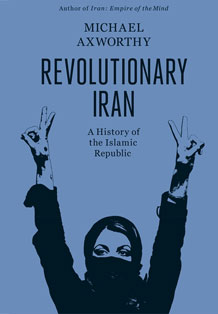
Front book cover:Revolutionary Iran: A history of the Islamic Republic
Revolutionary Iran
As Iran gears up for its elections in June, it is timely to have a major new book about the Islamic Republic. ‘Revolutionary Iran’ is the latest book by Dr Michael Axworthy, the Director of the University of Exeter’s Centre for Persian and Iranian Studies.
The book is about the recent history of Iran and is drawn from Dr Axworthy’s own experience as a former head of the Iran section in the British Foreign Office, as well as archival research. It tells the story of Iran’s 1979 revolution and the country’s experience since then. In particular, it gives a full account of the brutal eight year Iran-Iraq War, one of the most bloody since the Second World War, the impact of which has had a profound effect on Iranian society and politics.
Dr Michael Axworthy said:“Having studied history rather than political sciences and having been a practitioner, I have a somewhat non-theoretical approach. As a scholar you have time to apply yourself and think in a more in-depth way, which in the Foreign Office you often don’t have.”
This major new and definitive work describes Ayatollah Khomeini's return to Tehran in February 1979, a key moment in post-war international politics as this large, well-populated and wealthy state suddenly committed itself to a quite new path. A revolution based on the supremacy of Islam and contempt for both superpowers.
In a prominent review in the latest Times Higher Education, the distinguished scholar Professor Ervand Abrahamian writes that if you were to read only one book on present-day Iran you could not do better than this. He welcomes the fact that Dr Axworthy debunks three widespread notions. First he shows that, contrary to Iranian government propaganda, Iran’s regular armed forces (and especially the air force) played an important role in fighting off the Iraqi invasion of 1980. Second, the book debunks the perception that the Islamic Republic is a threat to the region, with ambitions to create a vast empire, and equipped with an unlimited array of panzer divisions. Iran is shown to be instead a fourth-rate power spending less of its gross domestic product on arms than many of its neighbours, including Saudi Arabia, Iraq, Turkey and even the tiny Gulf emirates. Third, the book counters the alarmist claim that Iran is out to acquire nuclear weapons, suggesting rather that Iran’s real intention is likely to be to obtain the means to produce nuclear weapons if necessary in some dire future crisis, similar to many other countries.”
Abrahamian also welcomes the way that the book criticises both the purpose and the workings of the economic sanctions imposed on Iran by the United Nations, under pressure from the US and UK. Many, not just the Iranians, suspect that the real intention “was not to bring Iran to the negotiating table but to placate the Israelis and pull off a ‘regime change’”. George W Bush and Tony Blair also blamed Iran for problems in Iraq and Afghanistan; however the problems were mostly of their own making, even when Iran was in essence aiding the West.”
The book emphasises the need to understand Iran and Iran’s hard-won attachment to national independence, and concludes with a plea for renewed diplomatic engagement to resolve the longstanding US-Iran rift, which is at the bottom of the most recent tensions.
Date: 8 April 2013
